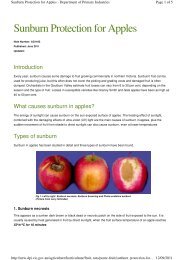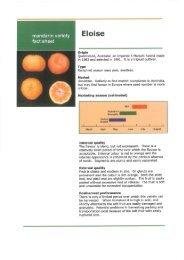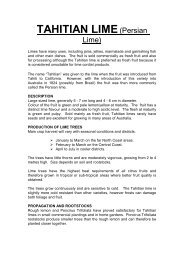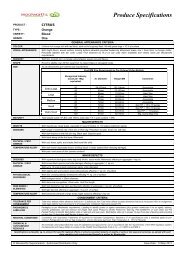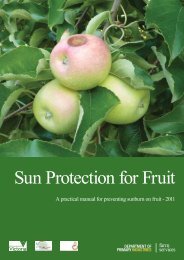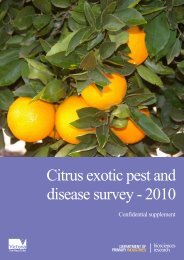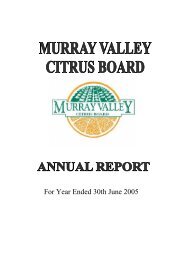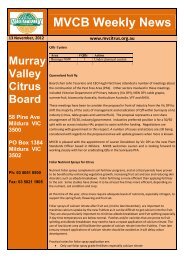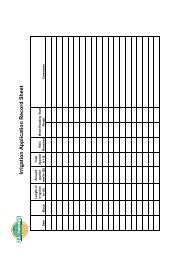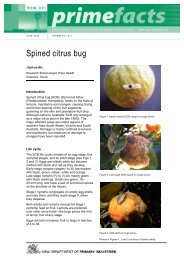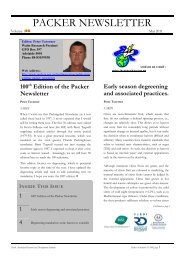Citrep #70 December 2012 - Murray Valley Citrus Board
Citrep #70 December 2012 - Murray Valley Citrus Board
Citrep #70 December 2012 - Murray Valley Citrus Board
Create successful ePaper yourself
Turn your PDF publications into a flip-book with our unique Google optimized e-Paper software.
not obtained secure markets, which in turn<br />
has increased supply and reduced returns.<br />
Positives for the industry have been the<br />
development of efficient methods of<br />
irrigation and nutrition application to<br />
make crops more productive. Consumer<br />
friendly developments such as ‘easy peel’,<br />
‘seedless’ citrus and gourmet products<br />
such as blood oranges have been a plus<br />
for the industry. Farming has become<br />
more technical but less physical, although<br />
oranges still need to be handpicked. <strong>Citrus</strong><br />
farmers have needed to become smarter<br />
and more productive.<br />
The reliance on export markets today<br />
for citrus farmers to be profitable is of<br />
concern when we have no influence on<br />
the biggest single factor affecting that<br />
profitability, the exchange rate. Our<br />
greatest frustration is we can grow and<br />
produce some of the best citrus in the<br />
world, but it is unsustainable due to<br />
factors outside of our control.<br />
Governments of all persuasions are<br />
reducing the funding for research and<br />
development in all rural industries,<br />
including citrus, and this will have<br />
long-term repercussions in the industry.<br />
The realisation is that free trade has<br />
harmed farmers in many ways and not<br />
helped. I don’t have the answer to this,<br />
but non-farming politicians and<br />
governments don’t seem to want to<br />
acknowledge the harm done through<br />
their well-meaning policies.<br />
Labelling of product has been a problem,<br />
but this is improving over time. Consumers<br />
need to be constantly educated about<br />
where food is grown and all the reasons<br />
why they should buy Australian.<br />
6<br />
Newsletter of the <strong>Murray</strong> <strong>Valley</strong> <strong>Citrus</strong> <strong>Board</strong><br />
Geoff Rix - <strong>Board</strong> Member Profile Cont’d from page 5...<br />
Left-right:<br />
1. Geoff and Ken checking graft<br />
2. Geoff Anabelle, and Bronte<br />
Priorities; what still has to be done<br />
- now and in the medium to long-term<br />
Attempts are now being made to address<br />
some immediate threats to our industry,<br />
for example access to markets (particularly<br />
Asia) via pest free production areas and<br />
protocols. These trade agreement controls,<br />
which are hard to meet, are necessary if<br />
we want to stay in business.<br />
The functions the farmer must perform<br />
to meet stringent export protocols mean<br />
the cost of production is always going to<br />
increase, so unless the returns increase<br />
then we go out of business. Farmer<br />
viability is thus dependant on securing<br />
profitable markets, which will pay for<br />
our premium citrus to fund the cost of<br />
production.<br />
All people in the supply chain of citrus<br />
have a responsibility in making the product<br />
reach it’s destination in a condition where<br />
the buyer will pay returns needed for our<br />
cost of production. Spreading the risk in<br />
marketing our product by opening up new<br />
markets has to be achieved by our national<br />
body, and implemented at grass roots by<br />
our local or regional bodies.<br />
This information spread and industry<br />
development can’t be done by one group<br />
alone, but by all groups working together,<br />
however different the regions wish to<br />
represent themselves. New citrus leaders<br />
need to be identified and supported.<br />
Successful existing organisations and<br />
bodies should not be dismissed as being<br />
irrelevant or unsustainable, but should<br />
be worked with for their one desire of<br />
achieving a strong profitable industry.<br />
Grower levies need to be collected, but<br />
used in a manner where there is proven<br />
value to the industry as a whole, on a<br />
national and regional basis.<br />
Things that give you satisfaction<br />
because they make a contribution<br />
to the industry<br />
Knowledge given freely at field days, by<br />
people who spend time helping growers<br />
because they believe they can make<br />
a difference, are a source of personal<br />
satisfaction. I am always amazed that<br />
people will help others without the<br />
expectation of reward or recognition.<br />
The confidence I obtain when meeting<br />
people who are passionate about the<br />
industry will often get me thinking about<br />
new ideas and renew my drive to do things<br />
to improve my crop/trees and farming<br />
practices.<br />
I take the responsibility of being a <strong>Board</strong><br />
member of the <strong>Murray</strong> <strong>Valley</strong> <strong>Citrus</strong> <strong>Board</strong><br />
seriously. It is important that there is a<br />
strong regional voice and local grower<br />
levies are spent in the area, particularly<br />
on issues such as bio-security, grower<br />
education, development of varieties that<br />
suit a changing climate and securing better<br />
returns for growers. Local representation,<br />
decision-making, large and small-scale<br />
growers and strong relationships within<br />
the industry and with key stakeholders<br />
(such as processors and Government) are<br />
all important to the future of the industry.”



